Britain’s high streets have been in decline for years but little shows the true extent of the crisis like the agonising tale of Debenhams.
Once a stalwart of the British shopping experience and the anchor around which other stores could thrive, the bedraggled shells of former Debenhams stores now litter this country’s streets.
Around 12,000 jobs were lost when the company went into liquidation in 2021. Fenced off or boarded up, many of them are covered in graffiti. Others have already been torn down or cloaked in scaffolding as they wait to be converted into flats.
Although Boohoo has bought the Debenhams website and name, none of the department stores have ever reopened — meaning the death of yet another high street brand.
Tragically, shoppers who enjoy the experience of leaving their bedrooms and getting some fresh air before trying products in person are a dying breed. This has led to some town centres becoming dangerous havens for vandals and drunks.
Paul Dobson, a professor of business strategy and public policy at the University of East Anglia (UEA), says councils that neglect their towns and cities risk starting a ‘death spiral’ for the high street.
He said with every shop that closes and lays empty, a high street can become a less attractive place to start a business – thus fuelling the decline even further.
Ipswich local Antonia Cook, 25, a teaching assistant for special needs primary school children, put it more bluntly to MailOnline. She said: ‘I miss Debenhams. A lot of my friends worked here. Now it just [has] a feeling of urban desolation in a ghost town riddled with barbers and vape shops.’
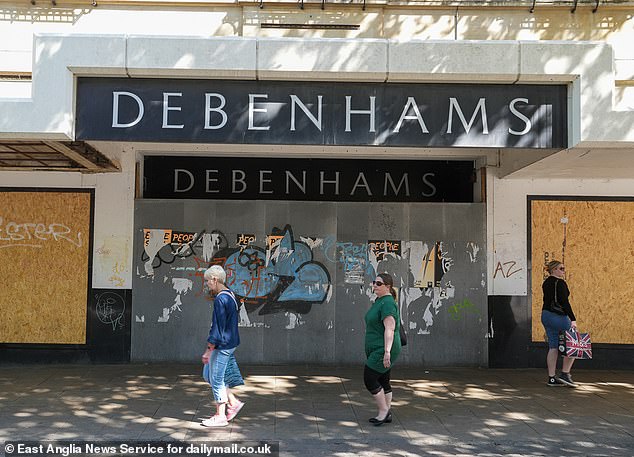
Many Debenhams stores up and down the country, like this one in Norwich, are boarded up
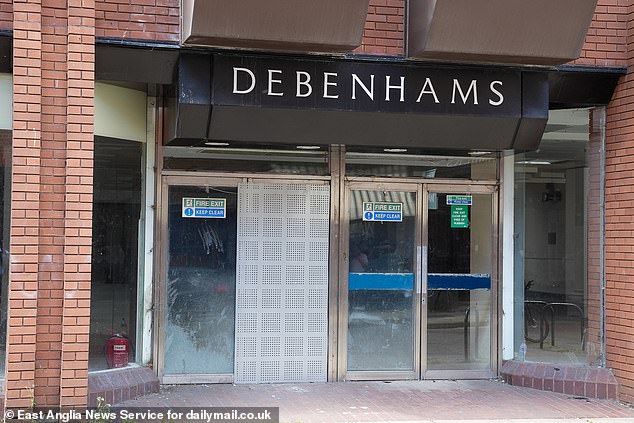
Yet while Debenhams went into liquidation in 2021, many of the stores are still empty, such as this one in Ipswich
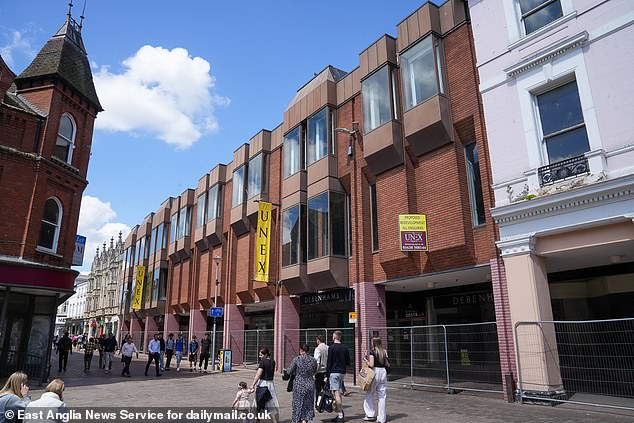
Councillor Neil MacDonald, the leader of Labour-run Ipswich Borough Council, said: ‘The former Ipswich Debenhams sits at the heart of the town centre. Its stripped out, vacant state has a blighting impact on the town’
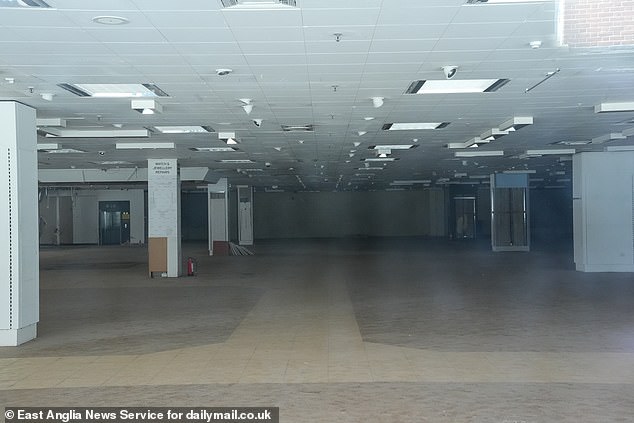
Pictured: Inside the empty Debenhams in Ipswich that has been empty for around four years
![Cllr MacDonald added: 'It is deeply disappointing that [the store's] Suffolk-based owners have not been able to get it re-occupied'](https://www.americanpolibeat.com/wp-content/uploads/2025/05/1748210244_845_The-death-of-Debenhams-The-reason-why-ghost-stores-are.jpg)
Cllr MacDonald added: ‘It is deeply disappointing that [the store’s] Suffolk-based owners have not been able to get it re-occupied’
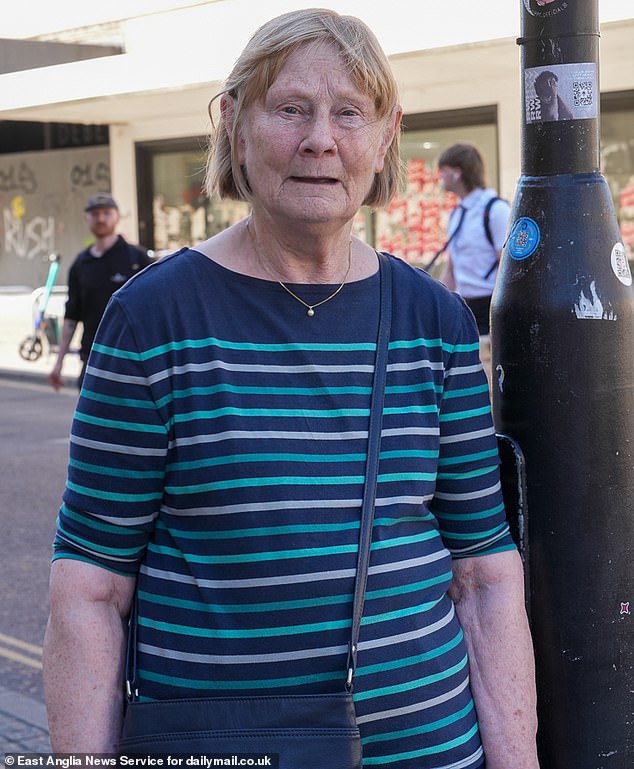
Locals like Dorothy Lumb, 78, (pictured) have railed against people shopping online
Debenhams, which employed more than 20,000 people before the pandemic, had been suffering poor sales for years as shoppers moved away from traditional department store models.
But the enforced closure of sites during the pandemic was the final straw, resulting in the company falling into administration within weeks of the virus fully hitting the UK.
Debenhams then started its liquidation process at the start of 2021 after failing to secure a rescue sale.
In January 2021, Boohoo acquired the name and website operations of Debenhams from its administrators for £55million – but did not take on any of the firm’s workforce or High Street stores, which Debenhams confirmed would close for good.
Prof Dobson said: ‘[Debenhams] stores have remained empty because their large size and central location makes them only suitable as department stores, which is a sector being squeezed by increased online competition.
‘It is difficult to re-purpose these large stores into smaller units, resulting in them staying empty or being turned into residential flats.
‘There is a future for department stores and British high streets as long as there is sufficient concentration and diversity of stores in a town or city centre to make these attractive go-to destinations, which provide an enjoyable and sociable shopping experience that online shopping cannot match.
‘Business rates play a part in stopping new store owners taking over the empty spaces because they skew competition and create an unlevel playing field making it harder for physical stores to compete with online retailers.
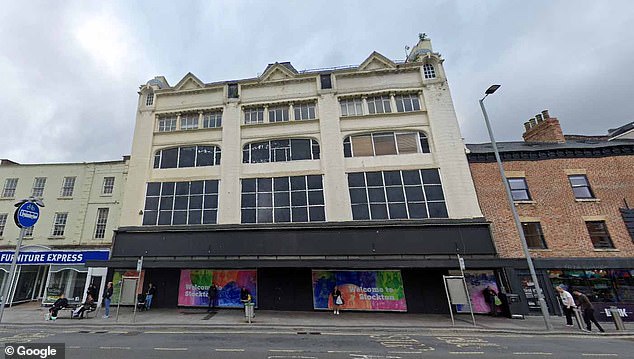
Stockton Council bought the old Debenhams building in October 2023 but it has so far remained empty
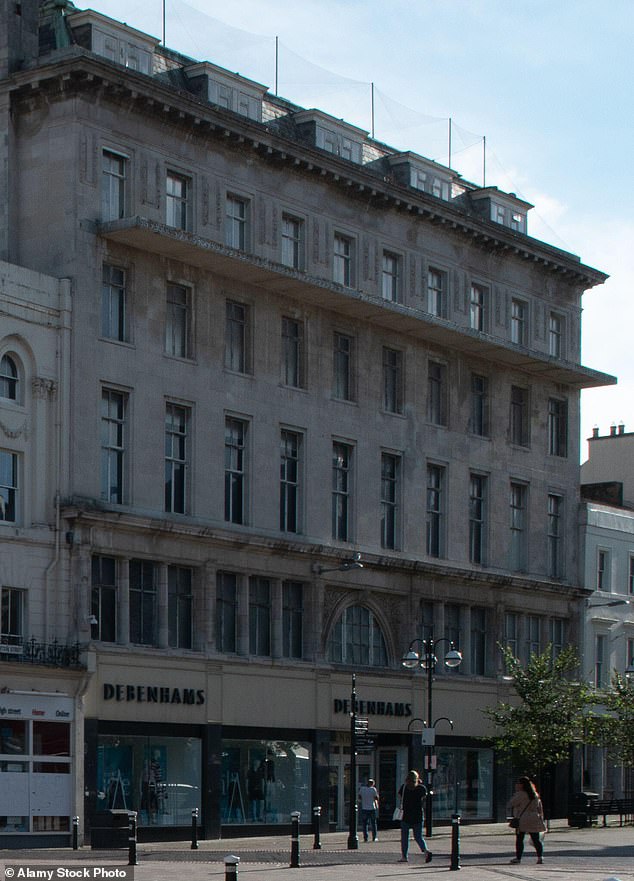
This huge Debenhams in Hastings, East Sussex, has also been empty for years
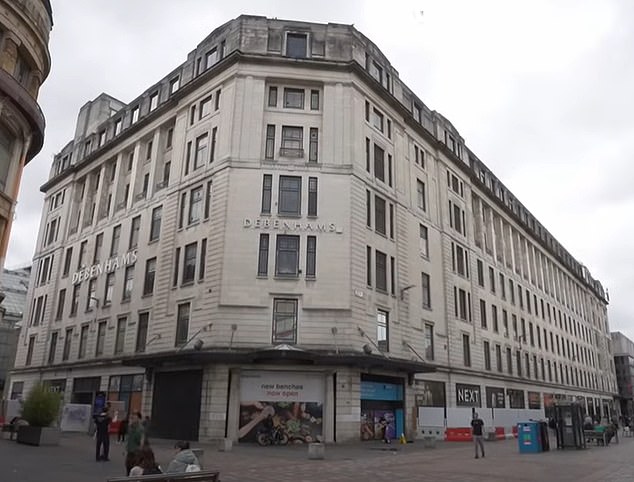
Glasgow’s Debenhams has also remained empty and disused since the firm went into liquidation in 2021
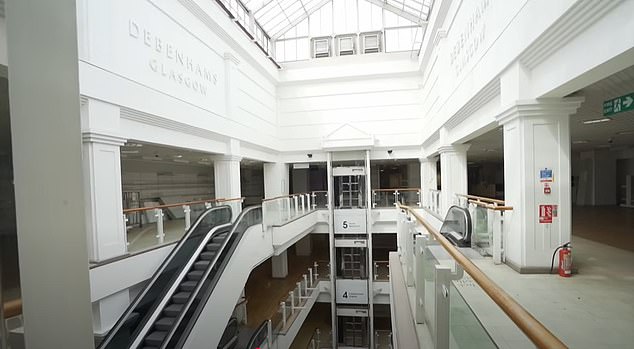
Inside the five-floor shop (pictured this week), the space still has escalators and shop signage
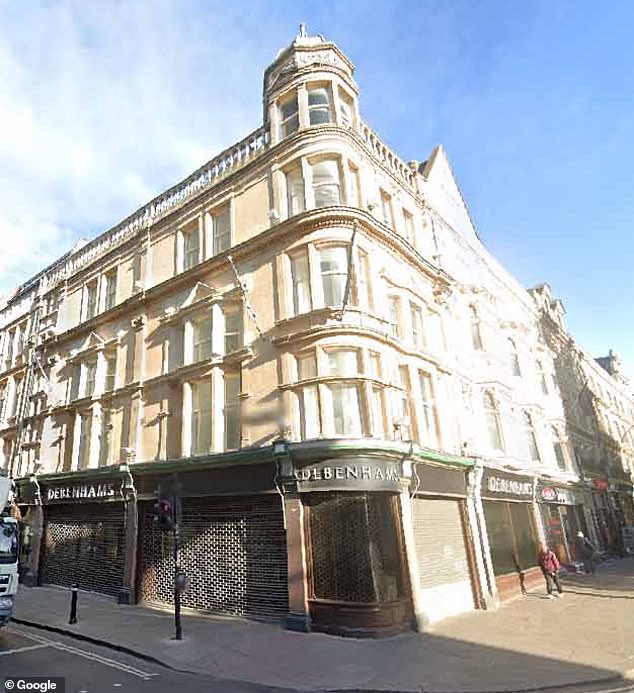
There have been suggestions the Debenhams store in Oxford (pictured) could become lkab space for scientists
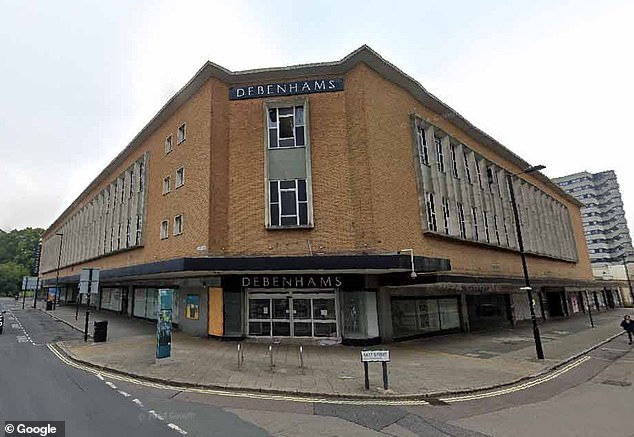
Southampton’s Debenhams (pictured in July last year) has been torn down to make way for a 17-storey block of flats
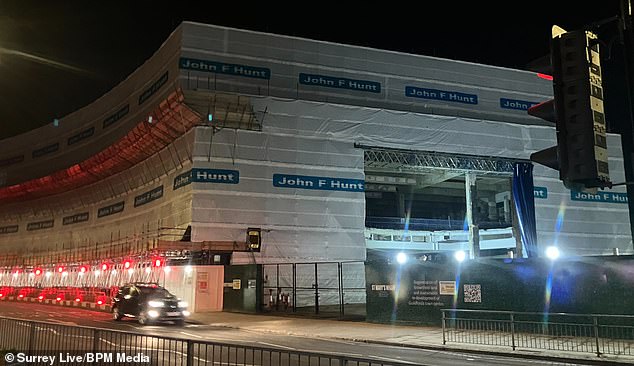
Guildford’s Debenhams (pictured in March) is in the process of being demolished to make way for 185 homes as well as business spaces and restaurants
‘Similarly, underinvestment and neglect by councils in city and town centre facilities and management, like ensuring easy access with cheap car parking and good public transport, is also undermining the vitality of high streets.
‘The combination is a posing a serious risk of a death spiral, where each shop closure undermines the viability and attractiveness of the remaining ones as a shopping destination.
‘Some cities and towns can absorb the odd shop closure without harming the overall ambience and attractiveness of the centre as a shopping destination, especially when there are other attractions such as entertainment alongside a rich variety of relaxed eating and drinking establishments in a beautiful setting.
‘Other locations, though, are struggling and reaching a tipping point where successive shop closures are making the centre unattractive, if not an eyesore, which increasingly puts off shoppers, so fuelling a downward spiral that can be difficult to reverse without major investment.
‘Avoiding that tipping point with smart ways to maintain the attractiveness of town centres is the critical factor for keeping British high streets alive and vibrant.
‘Unfortunately, time is running out for many British high streets unless they can remain go-to destinations that offer shoppers a satisfying and convenient experience.’
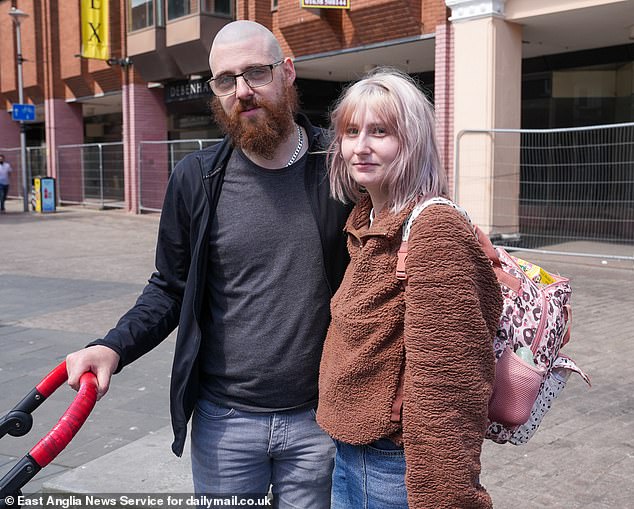
Pictured: Mother-of-two Cheyenne, 27, shopping in Ipswich with her husband Rob, 30, a warehouse worker. Speaking about the empty Debenhams store there, Rob said: ‘It’s depressing. It’s such a big area with so much potential’
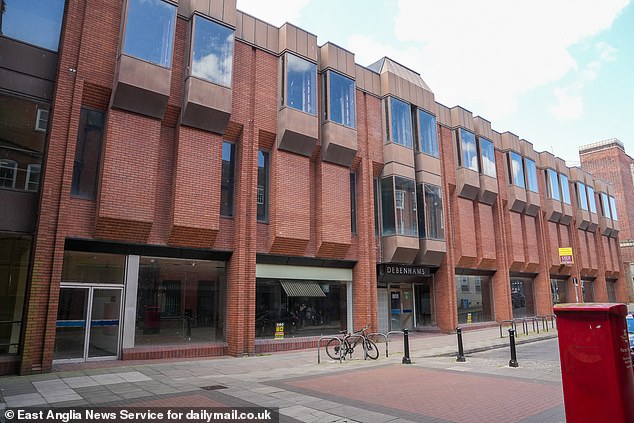
The store spanned three floors but so far has been left empty in the town centre for almost half a decade
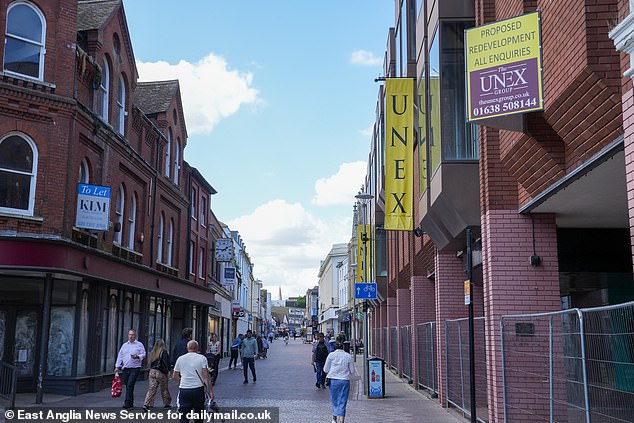
Other shops on the main street in Ipswich had also closed down, as was evident from multiple ‘to let’ signs
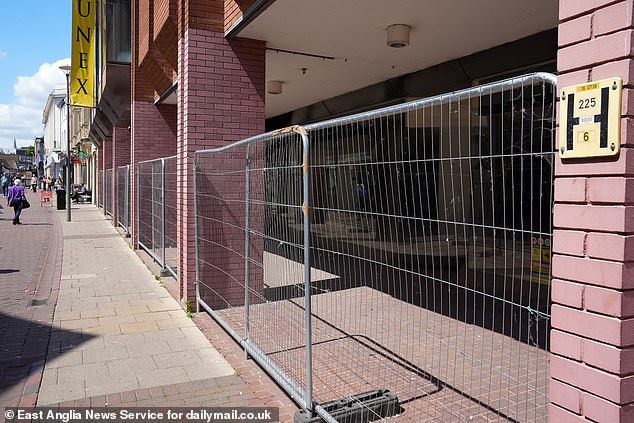
The Debenhams in Ipswich was surrounded by a metal fence chained to the brick columns surrounding the outside of the store
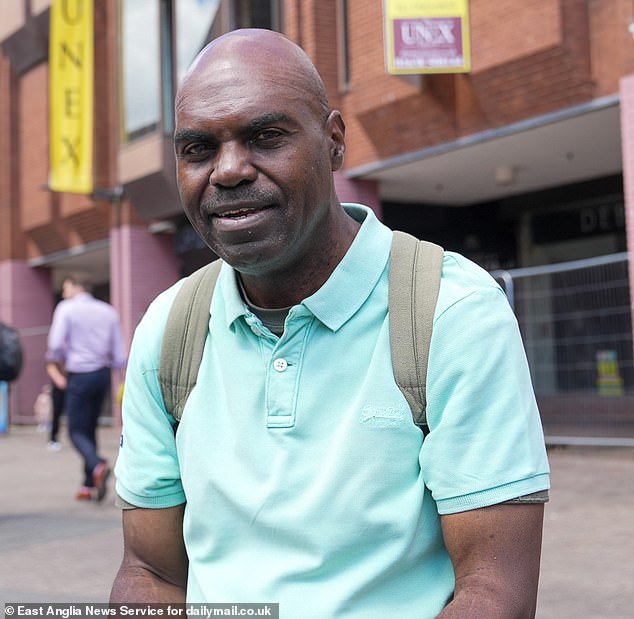
Noel Thompson, 59, (pictured) a cleaner from Ipswich, said: ‘It’s an eyesore. It’s desolate. It’s probably because people don’t have a lot of money to spend’
![Ipswich local Antonia Cook, 25, (pictured) said: 'I miss Debenhams. A lot of my friends worked here. Now it just [has] a feeling of urban desolation in a ghost town riddled with barbers and vape shops'](https://www.americanpolibeat.com/wp-content/uploads/2025/05/1748210245_905_The-death-of-Debenhams-The-reason-why-ghost-stores-are.jpeg)
Ipswich local Antonia Cook, 25, (pictured) said: ‘I miss Debenhams. A lot of my friends worked here. Now it just [has] a feeling of urban desolation in a ghost town riddled with barbers and vape shops’
He also suggested ‘a special exemption for city and town centres’ from the Sunday Trading Act 1994 so stores ‘can provide an all-day shopping and entertainment experience’.
At the moment, the Sunday Trading Act 1994 means large shops (those with floor areas exceeding 280 sq metres) can only open for six hours between 10am and 6pm on Sundays.
MailOnline understands the Government intends to introduce a higher business rate on the one per cent most valuable business properties, which it says will fund permanently lower rates in 2026 and removing the £110,000 cap, which it claims will help more than 280,000 retail, hospitality and leisure properties.
The government is also extending 40 per cent relief for 250,000 properties and freezing the small business multiplier which it says, together with Small Business Rates Relief, will protect over a million small properties from inflationary increases.
Until 2026, business rates bills will be protected from inflation (through a frozen multiplier for 90 per cent of properties) and there is 40 per cent relief on business rates bills next year for 250,000 retail, hospitality and leisure premises.
Prof Dobson added: ‘The complexity of this arrangement speaks volumes as a sticking plaster over an outmoded business rate system that could take years to sort out given the current slow pace of change.
‘Retail businesses need certainty for investment planning, not a relief system that could be taken away at the stroke of a politician’s pen, especially given the fiscal tightrope that the government is having to walk given the country’s parlous state of public finances.’
British Retail Consortium (BRC) chief Helen Dickinson suggested that all hope was not lost and that ‘footfall has been rising over the last few months’.
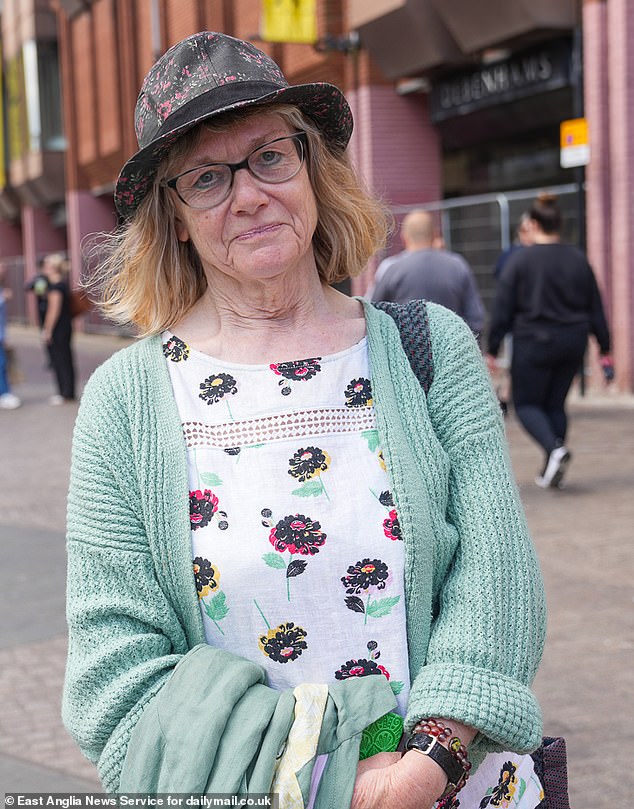
Pictured: Retired teacher Ann outside the former Debenhams store lying empty in the centre of Ipswich, Suffolk
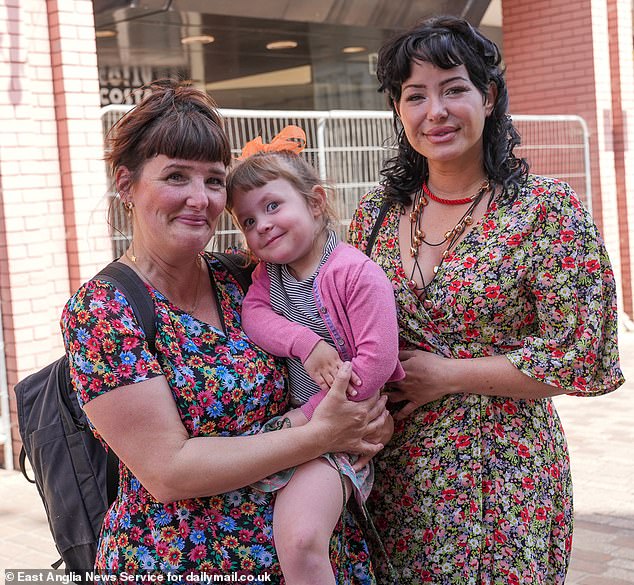
Lydia Walters, 37, (left) and her daughter Daisy, three, with Anna Pont, 36, outside the former Debenhams store that is still empty in the centre of Ipswich, Suffolk
However, she told MailOnline expensive business rates were ‘holding back high street investment’ and were the single biggest block to opening new stores according to BRC members.
She said: ‘For all retailers opening new stores, knowing you have to take on that burden is difficult.
‘Business rates are paid regardless of whether you are doing really well or your business is struggling.
‘[They] are a major factor behind so many vacant shops. When a department store or any large store becomes vacant, it can damage footfall for surrounding shops and businesses.
‘Anchor stores are often a destination for customers and they support the smaller businesses around them.’
Regarding the government’s proposed reforms, she added: ‘These could be a great opportunity for government to rebalance the disproportionate tax burden on retail and promote growth across the country.
‘They need to make sure they help, not hinder, the high street and don’t kill off investment, whether in big stores that bring in the footfall or more widely. That is why it’s essential no shop pays more as a result of these reforms.’
However, not all Debenhams stores are going to waste. The owner of House of Fraser, Frasers Group, has taken over a number of former Debenhams shops.
Talking about why so many of the old stores are empty, a Frasers Group spokeswoman said: ‘This is not just a Debenhams issue. So many shops are empty because the cost of running large physical stores has become unsustainable.
‘High business rates, rising wages and extra charges on bigger spaces are driving retailers away from town centres. Without serious reform from the Government, there is little incentive for retailers to return to the British high street.
‘We believe in the UK high street – it’s in our DNA. But it can’t survive in its current form. Costs are too high, and without serious reform, it’s hard to see how more retailers will survive.

This Debenhams in Norwich used to be a thriving department store spanned over four floors
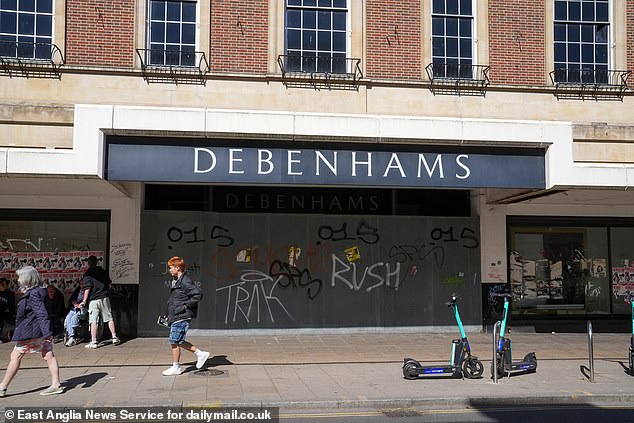
Men with cans of alcohol stood outside the graffitied front of Debenhams when MailOnline visited the store
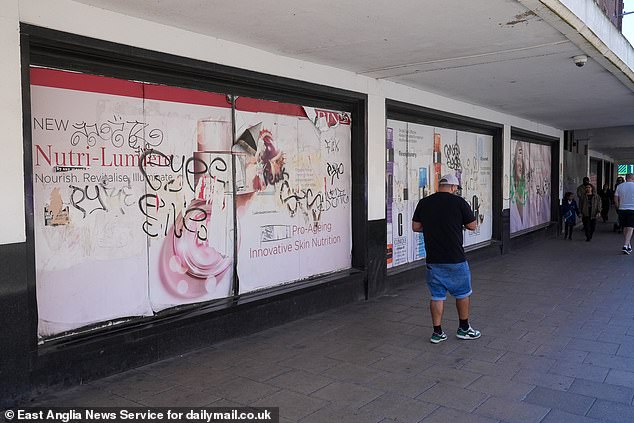
Peeling beauty product posters were defaced with graffiti outside the Debenhams store in the centre of Norwich, Norfolk
‘We have full confidence in our own strategy, but for the wider UK retail sector, the Government needs to step up if they want the UK high street to have a future.’
She added the group had ‘managed to stay ahead thanks in part to our diversified portfolio of brands and by thinking differently about physical retail’.
The spokeswoman said: ‘Since 2019, we’ve invested heavily in upgrading our store portfolio and creating spaces that are destinations in their own right.
‘Our Frasers concept stores are a good example of this. We take large, empty sites and turn them into multi-brand experiences, combining everything from Frasers to Sports Direct under one roof.
‘We’re also growing beyond traditional retail, with new revenue streams like Frasers Plus, our flexible credit option, and Elevate, a new retail media platform that works both in-store and online.
‘We’ve also made strong progress expanding Sports Direct internationally, moving into fast-growing markets like South Africa, Malaysia, Indonesia to name a few. We see real potential in these markets and we’re just getting started.’
Even so, many locals in towns and cities with empty Debenhams remain unhopeful. They say the empty Debenhams stores has created a breeding ground for vandalism, rough sleepers and frightening behaviour.
Norwich local Lizzy Lanfear, 21, said: ‘It looks really ugly. I would want it to be a nice restaurant or something.
‘I think it makes the street look more rough. Personally, I don’t walk past this bit at night.’
Colleen Potter, 55, used to work at Debenhams in Norwich and is now at a small shop opposite the empty department store.
She was a manager in the Jon Richard Jewellery section of Debenhams before the store closed down the company’s collapse into liquidation in 2021.
Colleen told MailOnline: ‘That was a flagship store. [Now] it’s an eyesore. At one point we were getting a lot of rough sleepers.’
Former civil servant John Reynolds, 91, from Norwich, added: ‘It’s very sad. It’s all part of a general change in cities.
‘The huge size of it is the problem.
‘With a huge place like that [it will remain empty] unless you departmentalise it.’
Commenting on its appearance, he added: ‘As soon as somewhere is abandoned, you get graffiti.’
Dorothy Lumb, 78, a retired typist for a large manufacturing company, said: ‘It just leaves a big gap. It’s a shame people shop online.’
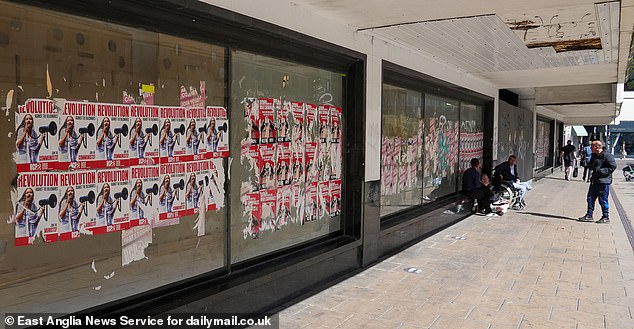
The store in Norwich has become a hub for homeless people and rough sleepers – with some locals too scared to walk past it at night
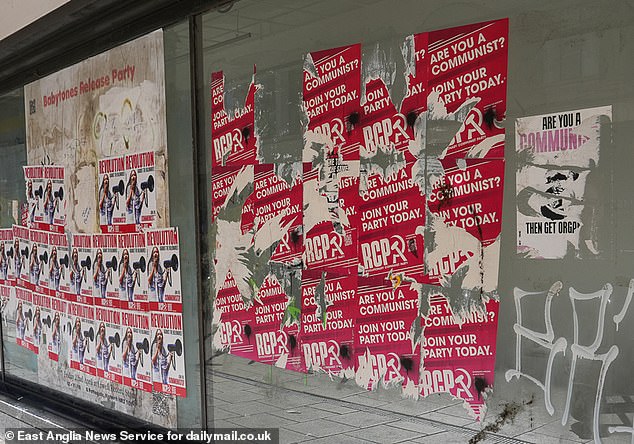
The windows have been covered in posters urging people to join the Revolutionary Communist Party of Britain
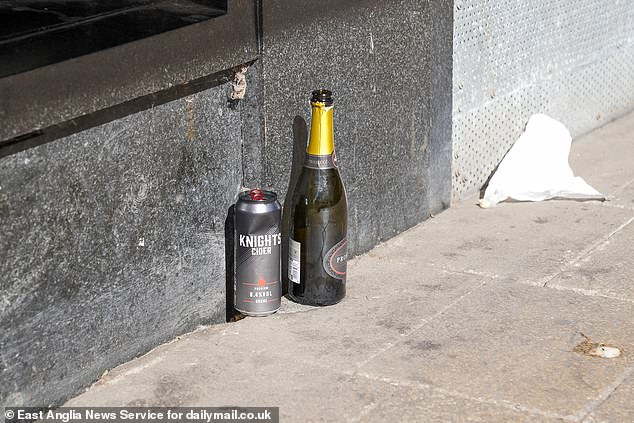
A bottle of prosecco and cider next to rubbish left outside Norwich’s Debenhams
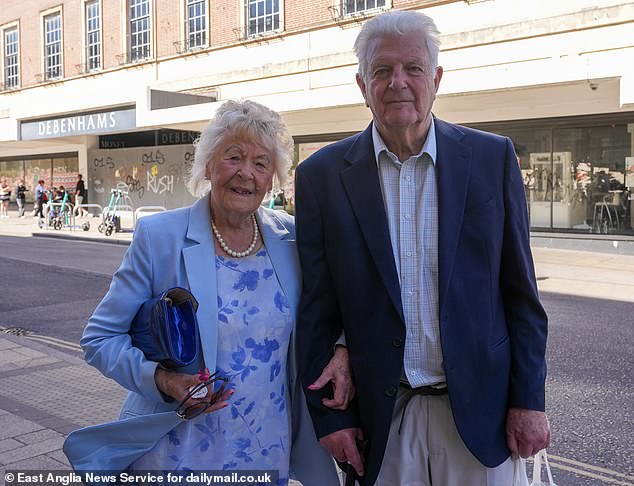
Pictured: John Reynolds, 91, and his partner of 22 years Joy Marriott, 87, outside the former Debenhams store in the centre of Norwich, Norfolk
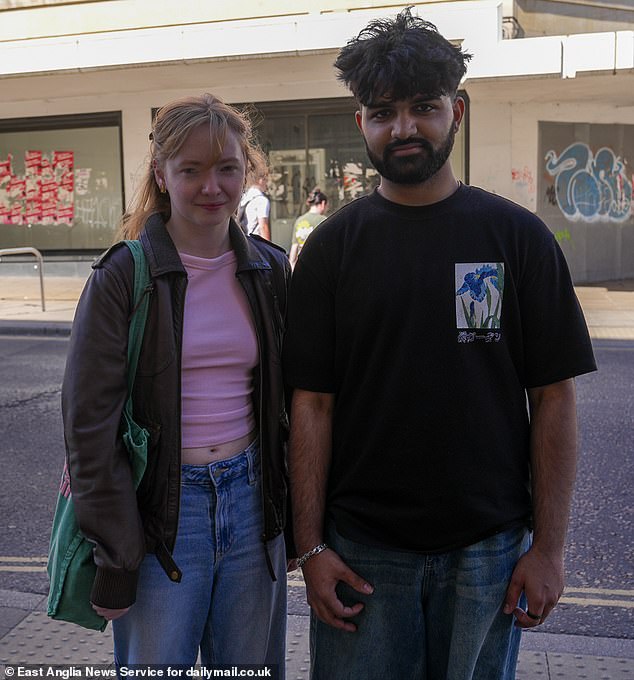
UEA student Sukhman Kunner, 20, said: ‘They could use the space for something else. It’s an eyesore being covered in all those Communist posters.’ Pictured: Mr Kunner with his friend Aimee Hurry, 20, a UEA graphics student
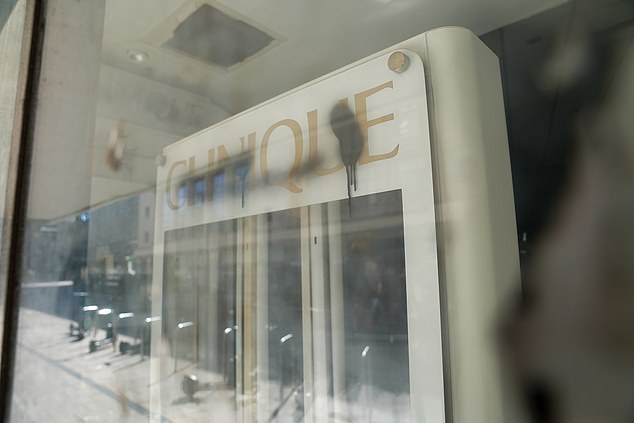
The Clinique sign could still be seen through the graffitied glass of Norwich’s Debenhams store
Aimee Palmer, 19, was a hairdresser visiting the city for a day. She said: ‘It looks scabby and trampy.’
Sukhman Kunner, 20, is a games, art and design student at the University of East Anglia (UEA).
He said: ‘They could use the space for something else. It’s an eyesore being covered in all those Communist posters.’
In the nearby town of Ipswich, Suffolk, locals said they missed their Debenhams and hoped it would one day turn into something that would boost the economy there.
Ann, 68, a teacher and grandmother-of-three from Felixstowe, said: ‘I used to like going to Debenhams to eat in the restaurant. The fish and chips were great.
‘Their restaurants were marvellous. I really miss them. It was a pleasurable place. There were various high street shops inside Debenhams. It’s an eyesore with the way they have fenced it off.’
Mother-of-two Cheyenne, 27, was shopping with her husband Rob, 30, a warehouse worker. Rob, who met his Cheyenne while playing bingo, told MailOnline: ‘It’s depressing. It’s such a big area with so much potential.
‘They were going to make it a concert hall which would have [helped] the economy around here but it’s still empty.’
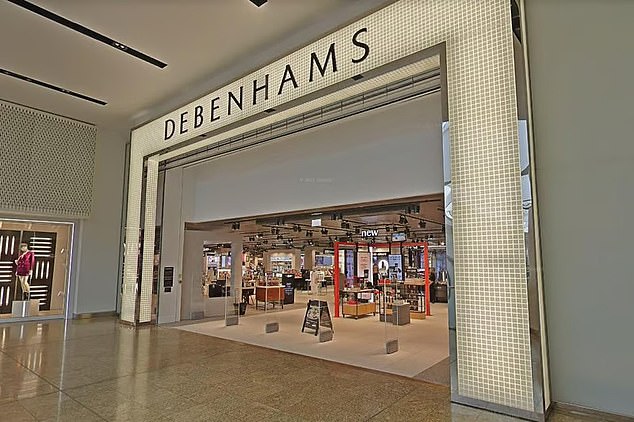
Pictured: A Debenhams in Sheffield’s Meadowhall shopping centre during better times
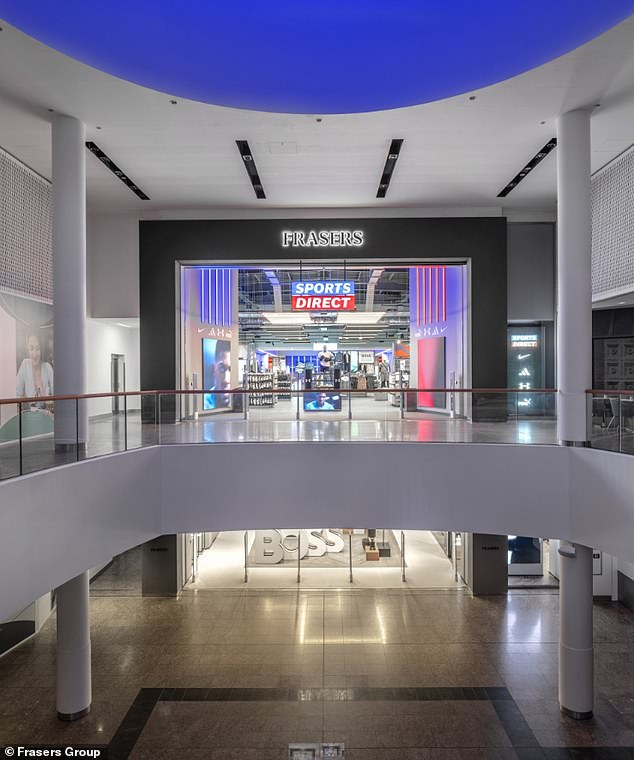
Frasers Group, the owner of House of Fraser and Sports Direct, has now taken over the old Debenhams space in Meadowhall
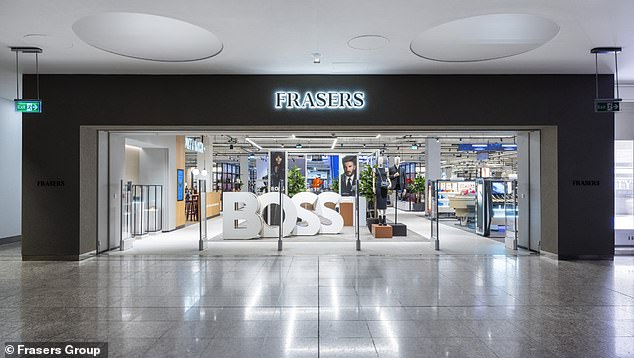
A Frasers Group spokeswoman said: ‘We believe in the UK high street – it’s in our DNA. But it can’t survive in its current form. Costs are too high, and without serious reform, it’s hard to see how more retailers will survive’
Noel Thompson, 59, a cleaner from Ipswich, said: ‘It’s an eyesore. It’s desolate. It’s probably because people don’t have a lot of money to spend.’
Meanwhile, Mother-of-three Anna Pont, 36, said: ‘It’s an absolute waste of space.
‘It had so many different areas. It was always busy. [Losing it] had a big impact for our town.’
Her friend Lydia Walters, 37, who is also a mother-of-three, said: ‘It’s the way it’s going. Where do we go now for our cr***y Christmas presents and perfume?’
Councillor Neil MacDonald, the leader of Labour-run Ipswich Borough Council, said: ‘The former Ipswich Debenhams sits at the heart of the town centre. Its stripped out, vacant state has a blighting impact on the town and it is deeply disappointing that its Suffolk-based owners have not been able to get it re-occupied.
‘The Council knows that a number of well-known retailers have enquired about occupying part of the ground floor but understands that terms have not been agreed.
‘Despite not owning the building, we continue to seek ways to bring about a re-occupation as we know that this would have a significant impact on the town – just as our recently announced action on the Grimwades building opposite will when its occupied later this year after some 12 years vacant.’
Yet while Debenhams stores have been closed since 2021, the brand name is still being used to sell goods online after it was bought by Boohoo.
Boohoo’s parent company rebranded as Debenhams Group earlier this year.
The firm said it has successfully completed an overhaul of Debenhams since it took over the brand and that it is now a ‘majority contributor to group profitability’.
Boohoo will now roll out the operating model at Debenhams across the wider firm, using the overhaul as a ‘blueprint for the wider turnaround of the group’.
It added: ‘Reflective of this major strategic change, the group will go forward as Debenhams group with immediate effect.’ The Boohoo brand will continue, as will other fashion brands owned by the group, such as Karen Millen and PrettyLittleThing.
Boohoo previously confirmed to MailOnline it has no plans to reopen physical stores.












